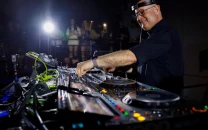Meesha comes to Faris Shafi's rescue after 'elite rappers' debate takes over Twitter
Arguments erupted after an academic asserted 'privileged' rappers like Faris should leave rap alone
1643705170-0/ipiccy_image-(3)1643705170-0-640x480.webp)
Rap, a genre of popular music developed as part of the hip-hop culture in the 70s, can be traced back to its African roots, centuries before hip-hop music existed. It primarily speaks to the marginalised and thus, is used frequently to oppose dominance.
But speaking on a similar tangent with a few of her own assumptions, author and sociologist Nida Kirmani shared her two cents on privilege and rap on Twitter that did not sit well with many music and Coke Studio fans, specifically Faris Shafi fans since Nida referred to him as an ‘elite’ rapper hogging a genre used to voice the plight of the underprivileged.
Among Faris’ many defendants was his sister and singer Meesha Shafi, who explained why Nida's argument was "flat and problematic" when applied locally and specifically to her brother.
The activist, in a tweet on Monday, shared that because "rap is an art form of the marginalised,” rappers like Faris should leave it. She began by writing, “Class and ethnic privilege effect every field in Pakistan but one of its most profound effects is on the arts. From music to literature to TV and film, most of those who make it big are members of the Punjabi elite.”
Class & ethnic privilege effect every field in Pakistan, but one of its most profound effects is on the arts. From music to literature to tv/film, most of those who make it big are members of the Punjabi elite. Coke studios throws in some Sindhis & Baloch as tokens but that’s it.
— Nida Kirmani (@NidaKirmani) January 31, 2022
Nida then claimed that a corporate music platform like Coke Studio “throws in some Sindhis and Baloch as tokens” but that’s that. Reducing Faris’ rap to entertainment, Nida then asserted, “Faris Shafi’s rap may be entertaining but it only reinforces this. Rap is an art form of the marginalised, adopted and transformed by folks from the inner city. This is why rappers like Eva B, coming from Lyari are part of a wider tradition. The elite should leave at least this.”
Faris Shafi’s rap may be entertaining but only reinforces this. Rap is an art form of the marginalised, adopted & transformed by folks from the inner city. This is why the rappers like Eva B coming from Lyari are part of a wider tradition. The elite should leave at least this.
— Nida Kirmani (@NidaKirmani) January 31, 2022
Rap thrives mostly in English and French speaking societies, due mainly to its relationship with resistance. According to a paper published by the University of New Mexico, studying hip-hop as a mode of resistance makes it possible “to more thoroughly understand and address the power arrangements of the places where it thrives in.” In his They Can’t Kill Us Until They Kill Us, Hanif Abdurraqib traces the interplay of privilege through the careers of hip-hop’s great white hopes. He elaborates how the song Pop Goes the Weasel came out in response to the rapid commodification of rap by the 90s, when “aspects of it became more palatable and less feared by the whites, courtesy of prepackaged megastars” like MC Hammer and Vanilla Ice.
But in her argument, Nida failed to check whether Faris really comes from privilege and even if he does, what all the Pakistani hip-hop scene entails and stands for. "Faris and I were raised by an extremely hard working, very financially stressed single mother. We do not come from money,” assured Meesha. “Are you suggesting, just because she put her sweat and tears into managing to give us a private education, we should step aside from our merits and talent and go do something else?" asked the Hot Mango Chutney Sauce crooner.
That’s a bit flat and problematic as a general perspective. Faris and I were raised by an extremely hard working, very financially stressed single mother. We do not come from money. Are you suggesting, just because she put her sweat and tears into
— MEESHA SHAFI (@itsmeeshashafi) January 31, 2022
She then pointed out that unlike many pop stars, Faris is “self-made” because he steered clear of commercial work, “making no money” for over 10 years “just so he doesn’t have to censor himself.” When a user interjected, “But if you are not privileged, you can't afford to live with all comforts without making money for 10 years,” Meesha replied, “who said he lived with all comforts? I know very well that people love to assume they know everything about public figures. But you know what they say about those who think they know everything, right?”
Who said he lived with all comforts? I know very well that people love to assume they know everything about public figures.. but you know what they say about those who think they know everything.. right?
— MEESHA SHAFI (@itsmeeshashafi) January 31, 2022
The Na Tutteya Ve singer went on to address Nida's comment about Faris’ rap being entertaining and called it “a grossly reductive and offensive statement to his brilliant pen and courage.” She went on to acknowledge, “I say this as his sister, sure. But more so as a fan of the genre. He is a pioneer and all the rappers you’re talking about pay great respect to his work.”
And ‘Faris Shafi’s rap may be entertaining’ is a grossly reductive and offensive statement to his brilliant pen and courage. I say this as his sister.. sure but more so as a fan of the genre. He is a pioneer and all the rappers you’re talking about pay great respect to his work.
— MEESHA SHAFI (@itsmeeshashafi) January 31, 2022
In response to this, a user argued that Faris’ raps are ‘narcissistic’ because he is “always bragging” – without realising that there’s a thing known as diss tracks – and claimed that “he has never been humble or represented any group, community or real societal issue.” Meesha replied: “I will take it more as a reflection of you that out of the [many] bars he’s written, you remember these two.”
I will take it more as a reflection of you that out of the 74928737382&2828737373828 bars he’s written, you remember these two.
— MEESHA SHAFI (@itsmeeshashafi) January 31, 2022
Nida, however, maintained that “certain traditions should be left to those who can lay some form of legitimate claim to them. But of course, everyone has a right to expression. Rap is funny as it is not indigenous to the region but it's problematic if only members of privileged groups begin to dominate.”
Re-tweeting this on her Twitter, Meesha sighed, “Oh Nida, I thought I saw some progress but…” She then informed Nida, “By the way, Punjabi tappay are very much rap that is indigenous to us. Ab agar Punjab se rap nikla tou [Now if rap came out of Punjab you] can’t hold that against the Punjabis. And I believe there is at least one academic paper on this.”
Oh Nida… I thought I saw some progress but..
— MEESHA SHAFI (@itsmeeshashafi) January 31, 2022
Btw Punjabi tappay are very much rap that is indigenous to us. Ab agar Punjab se rap nikla to can’t hold that against the Punjabis. And I believe there is at least one academic paper on this. https://t.co/ZaO0rOqdO7
In a separate tweet, Meesha also took a jibe at Nida, who teaches at LUMS. "The elite should only be allowed to teach at universities and educate other elites. How dare they appear on Coke Studio.” When a user also shared that they did not even know Meesha and Faris were related, the Boom Boom singer assured, “Lots and lots of people don’t know this because we were taught to rely on merit instead of ‘connections’ to open doors. There is no nepotism here.”
the elite should only be allowed to teach at universities and educate other elites. How dare they appear on Coke Studio.
— MEESHA SHAFI (@itsmeeshashafi) January 31, 2022
Lots and lots of people don’t know this because we were taught to rely on merit instead of ‘connections’ to open doors.
— MEESHA SHAFI (@itsmeeshashafi) January 31, 2022
Nepotism ka koi scene nahin hai. https://t.co/YQDPLltCC0



















COMMENTS
Comments are moderated and generally will be posted if they are on-topic and not abusive.
For more information, please see our Comments FAQ